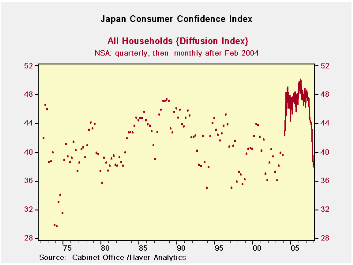 Global| Feb 13 2008
Global| Feb 13 2008Japan's Consumer Confidence Very Weak
Summary
Japan’s consumer confidence survey did not used to be monthly. That is why the chart shows its past as a quarterly report represented by unconnected dots co-joined with its new form in which the dots are connected month-to-month. [...]

Japan’s consumer confidence survey did not used to be monthly.
That is why the chart shows its past as a quarterly report represented
by unconnected dots co-joined with its new form in which the dots are
connected month-to-month. Based on a full sample of observations back
to 1988 the current Consumer confidence readings are very weak. Based
on the data from 2004 onward when monthly reporting kicked in these are
the worst levels for all of the components that this report has seen.
But in its broader historic context, while overall livelihood is nearly
at an all-time low, employment is still above mid range in its 54th
percentile. Willingness to buy durable goods is weak in the bottom 25
percentile of its range. The same relative position is true of expected
income growth. People assess the value of their assets as in about the
bottom third of its historic range.
Clearly Japan is undergoing some difficulties. The consumer is
still very concerned about the future. While the OECD leading
indicators show Japan in an upswing of sorts, Japan’s own indicators
continue to show the economy bogged down with some conditions still
worsening.
| Japan Consumer Confidence | ||||||||
|---|---|---|---|---|---|---|---|---|
| Monthly | Change over | Percentile of range* | ||||||
| Dec-07 | Nov-07 | Oct-07 | 3-mos | 6-mos | 12-Mos | Since 2004 | Since 1988 | |
| Overall Livelihood | 34.9 | 37.0 | 41.0 | -7.3 | -7.5 | -8.6 | 0.0 | 0.0 |
| Income growth | 39.6 | 40.7 | 42.2 | -2.8 | -2.6 | -2.5 | 0.0 | 26.1 |
| Employment | 40.6 | 43.1 | 45.3 | -5.8 | -8.4 | -8.4 | 0.0 | 59.7 |
| Willing to buy Durable Goods | 37.0 | 38.4 | 42.8 | -8.5 | -9.4 | -11.9 | 0.0 | 27.3 |
| Value of Assets | 40.8 | 42.4 | 44.6 | -3.4 | -5.9 | -4.7 | 0.0 | 40.1 |
| For two-person households; * Percentiles since Mar 2004 when series became monthly or full period | ||||||||
Robert Brusca
AuthorMore in Author Profile »Robert A. Brusca is Chief Economist of Fact and Opinion Economics, a consulting firm he founded in Manhattan. He has been an economist on Wall Street for over 25 years. He has visited central banking and large institutional clients in over 30 countries in his career as an economist. Mr. Brusca was a Divisional Research Chief at the Federal Reserve Bank of NY (Chief of the International Financial markets Division), a Fed Watcher at Irving Trust and Chief Economist at Nikko Securities International. He is widely quoted and appears in various media. Mr. Brusca holds an MA and Ph.D. in economics from Michigan State University and a BA in Economics from the University of Michigan. His research pursues his strong interests in non aligned policy economics as well as international economics. FAO Economics’ research targets investors to assist them in making better investment decisions in stocks, bonds and in a variety of international assets. The company does not manage money and has no conflicts in giving economic advice.
More Economy in Brief
 Global| Feb 05 2026
Global| Feb 05 2026Charts of the Week: Balanced Policy, Resilient Data and AI Narratives
by:Andrew Cates






